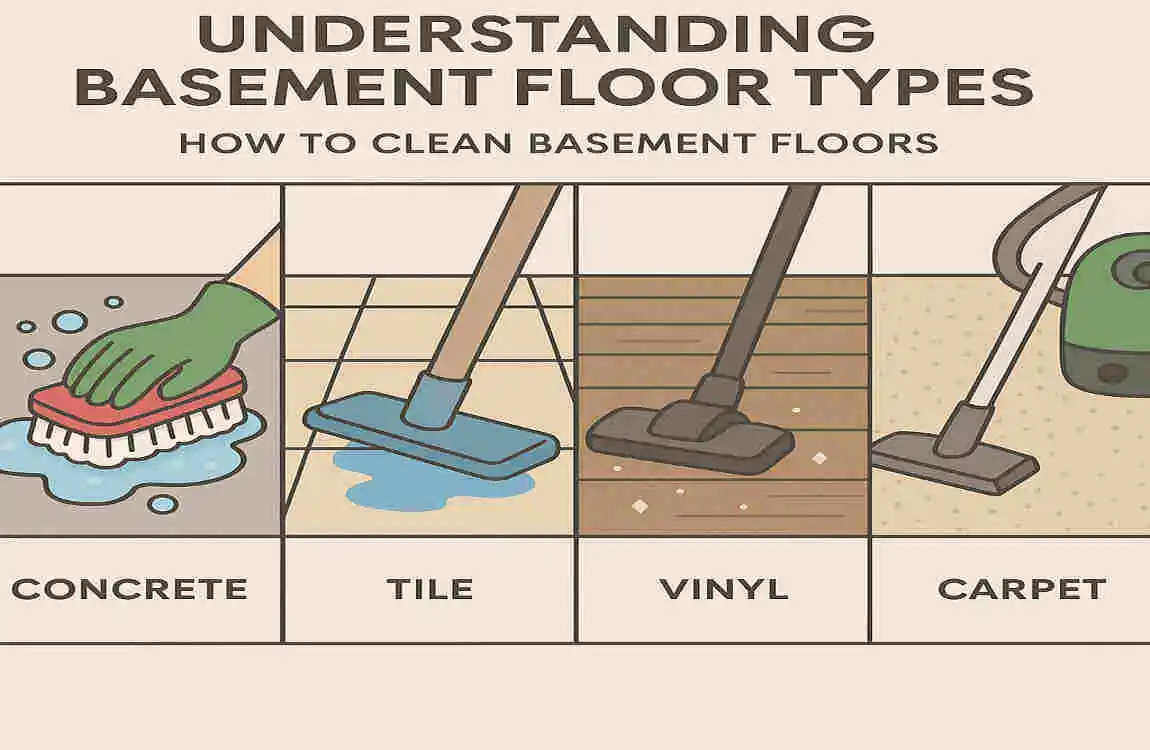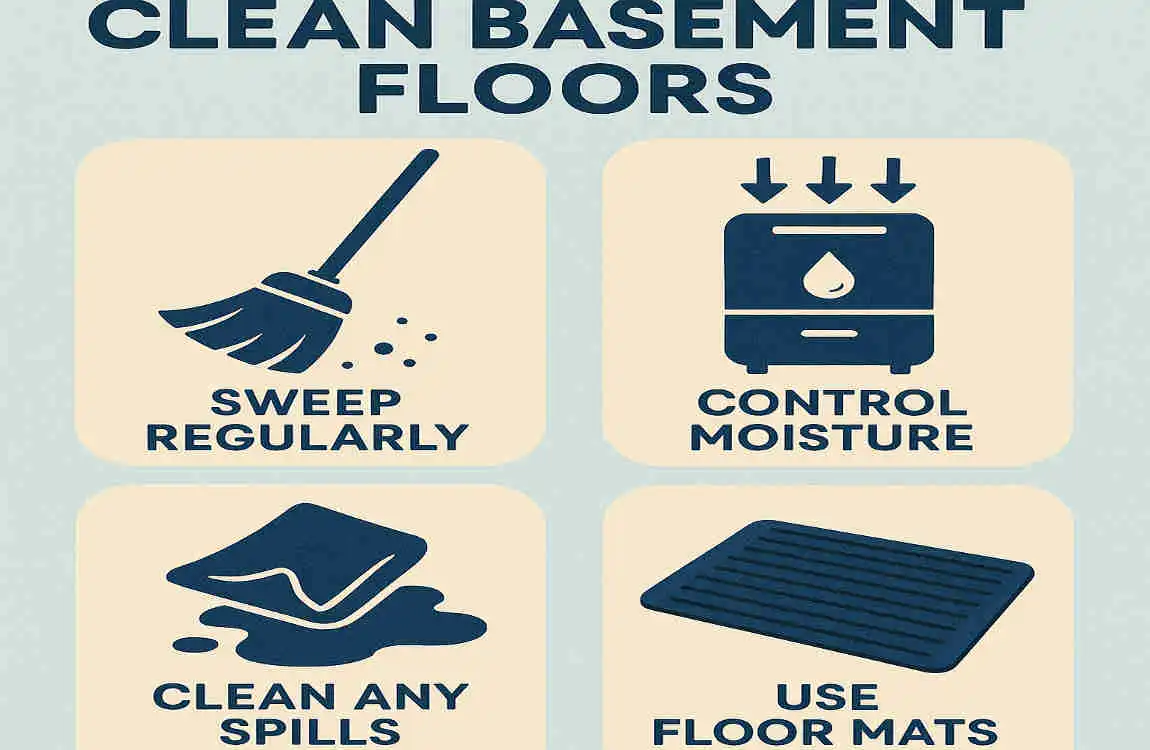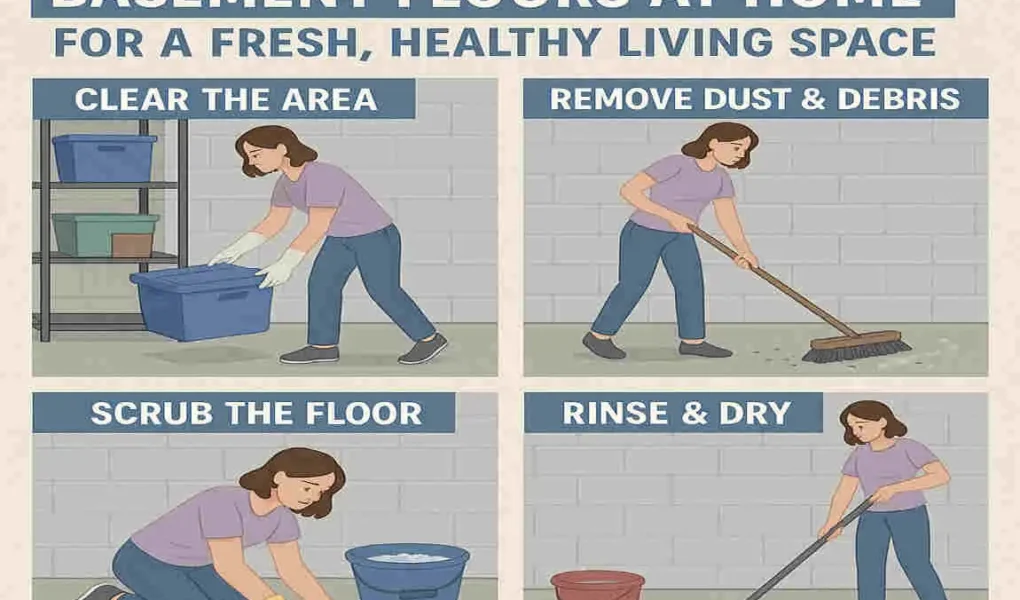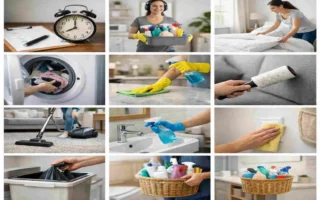A clean basement floor isn’t just about appearances—it’s essential to creating a fresh, healthy living space. Basements are often prone to dirt, dust, and moisture buildup, which can lead to unpleasant odors, mold growth, and even structural damage over time. Whether you use your basement for storage, a living space, or laundry, keeping the floors clean helps create a healthier home.
Why Cleaning Basement Floors Is Important

Basements are often overlooked in regular cleaning, but they play a significant role in your home’s overall condition. Here’s why keeping your basement floor clean matters:
- Improved Air Quality: Dust, mold, and allergens in the basement can circulate throughout your home.
- Prevention of Mold and Mildew: Damp and dirty floors provide the perfect breeding ground for mold.
- Structural Longevity: Regular cleaning prevents damage caused by dirt, moisture, and grime buildup.
- Enhanced Comfort: A clean basement is more inviting and usable for a wider range of purposes.
This guide will help you master the process of cleaning basement floors effectively, ensuring a healthier and more enjoyable living space for you and your family.
Understanding Basement Floor Types
Not all basement floors are created equal, so it’s crucial to identify the type of flooring in your basement before diving into the cleaning process. Each material requires a specific cleaning approach to avoid causing damage.
Common Types of Basement Floors
- Concrete Floors: Durable and common in unfinished basements.
- Tile Floors: Often used in finished basements; resistant to moisture but prone to grout stains.
- Vinyl Floors are easy to clean and popular for their affordability.
- Painted Floors: Concrete floors that have been coated with paint for a polished look.
Why Cleaning Methods Vary
Each type of flooring reacts differently to cleaning agents and methods:
- Concrete floors can handle harsher solutions but may require sealing to prevent moisture absorption.
- Tiles need special attention to grout, which can trap dirt.
- Vinyl and painted surfaces demand gentler cleaning solutions to avoid damage.
Preparing Your Basement for Floor Cleaning
Before you start scrubbing, prepare your basement for cleaning. Proper preparation not only makes the job easier but also ensures effective results.
Safety First
Basements often have limited ventilation, so take these precautions:
- Ventilation: Open windows or use fans to circulate air while cleaning.
- Protective Gear: Wear gloves, protective eyewear, and a mask if working with potent cleaning agents.
Clear the Space
- Move furniture, storage items, and other obstacles out of the way.
- For heavier items, consider using furniture sliders to avoid scratching the floor.
Remove Dust and debris
Start with a thorough sweep or vacuum:
- Use a broom or dry mop to remove loose dirt.
- A wet/dry vacuum can help eliminate hidden debris in cracks and corners.
Essential Tools and Cleaning Supplies
Having the right tools and supplies on hand is vital for effective cleaning. Here’s what you’ll need:
Recommended Tools
- Broom or Dust Mop: For initial cleaning.
- Bucket and Mop: A good-quality mop for applying cleaning solutions.
- Scrub Brush: For tough stains and grout cleaning.
- Wet/Dry Vacuum: To remove standing water or excess cleaning solution.
- Microfiber Cloths: For wiping down surfaces and drying floors.
Cleaning Agents
- Mild Detergents: Great for general cleaning.
- Bleach or Ammonia: Effective for mold and mildew (never mix these two chemicals!).
- Baking Soda and Vinegar: A natural, homemade solution for stain removal.
- Commercial Cleaners: Designed for specific floor types (e.g., tile or concrete cleaners).
Step-by-Step Guide: How to Clean Basement Floors
Now that you’re prepared, let’s walk through the cleaning process step by step.
Dry Cleaning
Begin by sweeping or vacuuming the floor to remove dust, dirt, and debris. This ensures the cleaning solution can penetrate the surface effectively.
Spot Treatment for Stains and Mold
Identify any stains or mold spots:
- For stains: Apply a mixture of baking soda and water or a commercial stain remover.
- For mold: Use a bleach solution (1 part bleach to 10 parts water) and scrub the affected area thoroughly.
Prepare the Cleaning Solution
- For concrete floors: Mix warm water with mild detergent or a concrete-specific cleaner.
- For tiles, use a tile cleaner or a vinegar-and-water mixture.
- For painted surfaces: Stick to a gentle detergent to avoid peeling the paint.
Scrubbing the Floor
Use a mop or scrub brush to clean the floor:
- Work in small sections for even cleaning.
- Apply gentle pressure to avoid damaging the floor’s surface.
Rinse Thoroughly
After scrubbing, rinse the floor with clean water to remove any remaining cleaning solution residue. Use a wet/dry vacuum to remove excess water.
Dry the Floor
Proper drying is crucial to prevent moisture damage:
- Use fans or dehumidifiers to speed up the drying process.
- Avoid walking on the floor until it’s scorched.
Advanced Cleaning Methods for Tough Stains and Deep Cleaning
For stubborn stains or heavily soiled floors, you may need to take extra measures.
Using Power Washers
Power washers are highly effective on concrete floors, but must be used with caution:
- Keep the pressure low to avoid damaging the surface.
- Always test on a small area first.
Specialized Cleaners
For deep stains or discoloration, consider using professional-grade products like muriatic acid (for concrete). Always follow safety instructions when handling these chemicals.
Tips for Maintaining Clean Basement Floors

Prevention is just as important as cleaning. Here’s how to keep your basement floors looking their best:
- Regular Cleaning Schedule: Sweep and mop weekly to prevent grime buildup.
- Control Moisture: Use a dehumidifier to combat humidity.
- Apply Sealants: Protect concrete floors with a sealant to prevent stains and moisture absorption.
- Avoid Harsh Chemicals: Stick to gentle, floor-appropriate cleaning solutions.
Common Mistakes to Avoid
Cleaning mistakes can lead to long-term damage. Here are some pitfalls to watch out for:
- Using Too Much Water: Excess moisture can cause mold growth, especially in basements with poor ventilation.
- Skipping Ventilation: Always ensure proper airflow to prevent chemical buildup.
- Ignoring Floor-Specific Needs: Using the wrong cleaner can damage your flooring.
Health Benefits of a Clean Basement Floor
A clean basement contributes to a healthier home by:
- Reducing allergens like dust and mold spores.
- Preventing structural issues caused by accumulated dirt and moisture.
- Creating a more inviting space for family activities or storage.
When to Call a Professional
Sometimes, DIY efforts aren’t enough. Call a professional if:
- You notice persistent mold or mildew.
- There are structural issues, such as cracks or uneven flooring.
- Stains remain despite repeated cleaning attempts.




